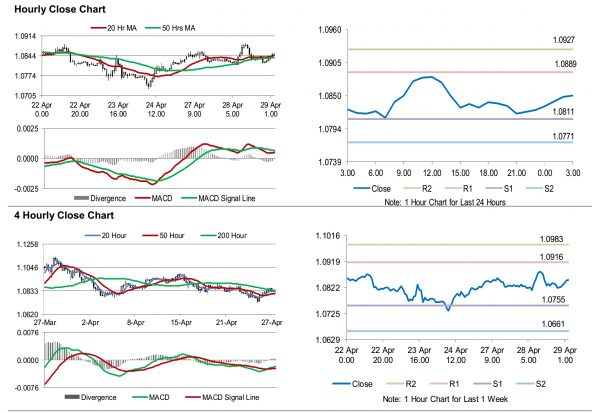For the 24 hours to 23:00 GMT, the EUR marginally declined against the USD and closed at 1.0826.
In the US, goods trade deficit widened to $64.2 billion in March, compared to a deficit of $59.9 billion in the previous month. Additionally, the Richmond Fed manufacturing index plunged to -53.0 in April, more than market consensus for a drop to a level of -6.0 and compared to a level of 2.0 in the prior month. Moreover, the consumer confidence eased to 86.9 in April, recording its largest drop since 1973 and compared to a revised level of 118.8 in the earlier month.
In the Asian session, at GMT0300, the pair is trading at 1.0850, with the EUR trading 0.22% higher against the USD from yesterday’s close.
The pair is expected to find support at 1.0811, and a fall through could take it to the next support level of 1.0771. The pair is expected to find its first resistance at 1.0889, and a rise through could take it to the next resistance level of 1.0927.
Moving ahead, traders would keep a watch on Euro-zone’s consumer confidence, industrial confidence and business climate, all for April, slated to release in a few hours. Additionally, Germany’s consumer price index for April, would keep investors on their toes. Later in the day, the US annualised gross domestic product (GDP) for 1Q and the MBA mortgage applications, along with the US Federal Reserve’s interest rate decision, would garner significant amount of investor attention.
The currency pair is showing convergence with its 20 Hr moving average and trading above its 50 Hr moving average.

